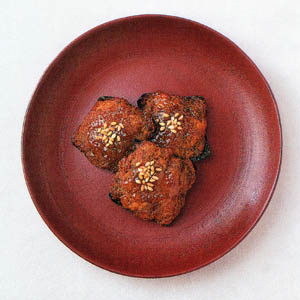Ingredients:
- 4 ounces (120g) potatoes, peeled
- 1 sheet of nori seaweed, about 7 1/2 x 8 inches (19x21cm) square
- 1/2 tablespoon sesame oil
- 1 tablespoon mirin mixed with 1 tablespoon soy sauce
- 1 teaspoon white sesame seeds, roasted, for garnish*
- shichimi pepper, for garnish, optional
Makes 16
Directions
1. Blend the potatoes to a rough paste in a food processor, then wrap in a paper towel to remove excess moisture.
2. Cut the nori into 16 squares and place a spoonful of potato on each
3. Fry the potato-and-nori squares in the sesame oil, nori side up, until the potato is golden brown. Then briefly fry the nori side.
4. Arrange on a serving plate, drizzled with the mirin-and-soy-sauce mixture, and garnished with sesame and shichimi.
[*Note: Raw sesame seeds should always be lightly roasted before using. Roast in a preheated, unoiled frying pan over low heat, shaking the pan back and forth until the seeds start to pop and release an aromatic, toasted smell.]

Reprinted with permission from the book:
The Enlightened Kitchen: Fresh Vegetable Dishes from the Temples of Japan
Kodansha International
While Japanese cuisine has become popular in the West, far less is known about the traditional fare originating from Japan's Buddhist temples. Natural and healthy, temple food is based on fresh seasonal vegetables, and staples such as grains and tofu. For centuries, these dishes have been a way of life - and a refreshing change of pace - for monks whose days are spent in rigorous self-discipline.
Mari Fujii delivers simple, seasonal foods with love and care. She teaches the importance of drawing out the natural flavors of ingredients rather than smothering with heavy sauces or spices. Any way you look at it, The Enlightened Kitchen is a nourishing experience for both body and soul.
ISBN4-7700-2493-2
Y2800
- Order this book from amazon.com
- Order this book from amazon.co.jp (in Japan)
- Find this book at your local English-language bookstore in Japan
- Or use the ISBN to order from your local bookstore.








